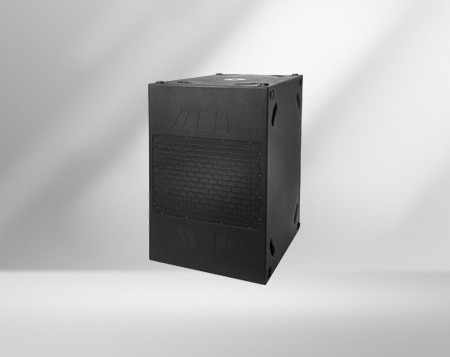source:Industry News release time:2022-04-21 Hits: Popular:Brand bar audio wholesale

Why do we always feel distant from the sound engineer, because the things they come into contact with are not easy to understand, for example, they always say a word or two that you don't understand in the chat, or they are operating the key The sound console seems to be densely packed with buttons and English... These make us think that the sound engineer is a high-level profession, but these are just the introductory knowledge of the sound engineer. Let's take a look at some common terms used by the sound engineer and the Chinese English contrast symbols.
1. What is level? What is impedance?
Level is a general term for voltage signals, current signals or electrical power signals. When only paying attention to the size of the electrical signal and not paying attention to the type of the electrical signal, it can be called the level.
Impedance is a general term for pure resistance, capacitive reactance, and inductive reactance. It indicates that the resistance unit of the circuit part to the flow of the alternating electrical signal is Ω (ohm). Pure resistance is often represented by R.
2. What is dB (decibel) number?
A unit of calculation for measuring the relative loudness of a sound, approximately equal to the smallest value of Z at which the human ear can usually perceive the difference in loudness; Degrees on 130 dB vs Frequency
Definition.
3. What is power?
Power refers to the work done by an object in unit time, that is, power is a physical quantity that describes the speed of work. The amount of work is fixed, and the shorter the time, the greater the power value. The formula for finding power is power = work/time.
4. What is distortion?
Refers to the phenomenon of changing the original shape (or other characteristics) of an object, image, sound, waveform, or other form of information. Distortion is often unnecessary.
5. What is frequency response?
Frequency response is referred to as frequency response, and the English name is Frequency Response. It is used in electronics to describe the difference in the processing ability of an instrument for signals of different frequencies. Like distortion, this is a very important parameter. Frequency response, also known as frequency response curve, refers to the change curve of gain with frequency. Any audio equipment or carrier (object that records sound signals) has its frequency response curve. The ideal frequency response curve should be flat, and the sound signal will not be distorted after passing through.
6. What is signal-to-noise ratio? What is noise figure?
The signal-to-noise ratio is the ratio of the normal sound signal played back by the speaker to the noise signal (power) when there is no signal. Expressed in dB. The higher the SNR value, the less noise.
Since the amplifier itself has noise, the signal-to-noise ratio at the output end is different from the signal-to-noise ratio at the input end. For this reason, the noise coefficient is used to measure the noise level of the amplifier itself. The larger the coefficient, the better. Description of the transfer process
The greater the noise incorporated in the device, the greater the imperfection of the device or channel characteristics.
7. What is sensitivity?
The sensitivity of the earphone reflects the amount of power that needs to be input under the same loudness. The higher the sensitivity of the earphone, the smaller the input power required, and the louder the output sound under the same power source.
Sensitivity is the ratio of the output voltage of the microphone to the input sound pressure under the excitation of unit sound pressure, and its unit is mV/Pa. To be consistent with a measure of the level in a circuit, sensitivity can also be expressed in decibels.
8. What is directivity?
Directivity is the response of a transducer in a specified plane through the acoustic center as a function of the direction of the emitted or incident acoustic wave at a fixed frequency. The low-frequency radiation of many noise sources is nearly non-directional, increasing with increasing frequency. This is because the radiated sound waves from different parts of the vibration source arrive at different points in space at different times, so there is interference to form non-uniform directional radiation. The directivity of the microphone is divided into directivity, cardioid directivity, supercardioid directivity, super directivity, etc.
Popular recommendation
Dance Stack Overview Car stereo Factory
2021-07-16XQ48 Bar sound bar Merchant
2021-07-26EVO 7TL-215 Sound bar Factory
2021-07-17Resolution 1.5 ktv bar sound Vendor
2021-07-16F88 Car stereo Merchant
2021-07-16EVO 6E KTV audio Merchant
2021-07-16AX 88KTV audio sales
2021-07-17F124 Home ktv audio Vendor
2021-07-14D2 AMPS Bar speakers wholesaler
2021-07-26XD12 Brand bar audio Vendor
2021-07-26I3 Small bar sound Vendor
2021-07-26A3 Home ktv audio Merchant
2021-07-26Simple configuration analysis of outdoor park waterproof speakers
2022-06-28Audio Tuning Essentials!Audio brand ktv
2022-04-16Hohhot ID-X Special Audio for Party Bar---Mateng Audio.Home ktv audio Processor
2022-07-05Composition of the stage broadcast audio system
2023-02-06The operating environment requirements of KTV audio equipment!Learning audio Vendor
2021-10-28Does the quality of the audio cable affect the sound quality?Brand bar audio sales
2021-12-17Baoan IOS Internet celebrity must punch bar special audio equipment--Mateng Audio
2022-04-21Tongxiang SPACE Party Bar Special Audio----Mateng Audio
2022-06-30The details that professional audio equipment needs to master.Bar performance sound Vendor
2021-11-18The role and characteristics of audio electronic crossover
2021-09-02What kind of speakers are used in nightclubs Mateng Audio
2022-12-14What are the advantages of CQ speaker series and KTV project cases
2021-09-17